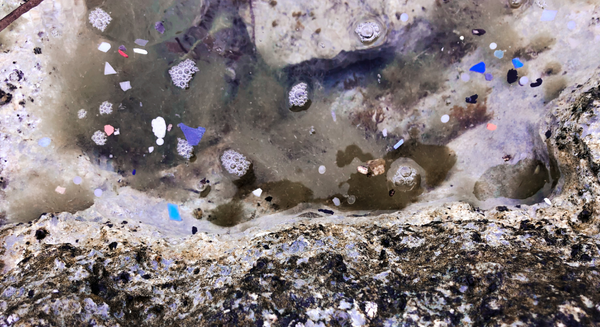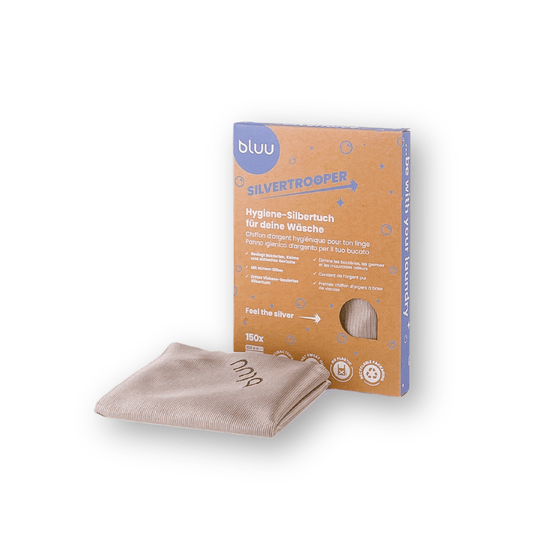7 simple tips on how you can prevent microplastics when washing
Microplastics harm our environment. Most of it comes from wearing and washing synthetic clothing. In the following article, we explain exactly what microplastics are and how you can prevent microplastics from being washed.
What you can do to avoid microplastics
- Wear clothes made from natural fibers
- Buy environmentally friendly detergent
- Wash hard textiles separately
- Reduce the washing temperature
- Avoid gentle wash cycles
- Do not use a tumble dryer
- Use a wash bag
What is microplastic?

Microplastics are solid, water-insoluble pieces of plastic that are smaller than 5 mm. They are barely visible to the naked eye and enter the environment through wastewater.
According to an EMPAstudy*, over 5000 tons of plastic are released into the environment in Switzerland every year. The most important source of microplastics in water is the washing and wearing of synthetic fiber clothing and cosmetics. An incredible 35 percent of the estimated 1.5 million tons of microplastics floating in our oceans come from synthetic fibres such as polyester, polyamide, acrylic or elastane.
*The study was conducted in 2019 on behalf of the Federal Office for the Environment. The seven most commonly used plastics were examined.
How do microplastics get into the washing machine?
During washing, microparticles are released from our clothes through friction and end up in rivers and oceans through wastewater.
Detergents with synthetic polymers also release microplastics. Powder detergents and fabric softeners promote fiber breakage.
How to avoid microplastics when washing
Here's what you can do to minimize microplastics from washing.
1. opt for natural fibers

As already mentioned, synthetic textiles are the main cause of microplastics when washing. These include polyester, polyamide and polyacrylic. The label on your clothes will tell you what material they are made of.
Avoid such fabrics if possible. Instead, opt for textiles that are free from microplastics, such as
- algae
- cotton
- hemp
- lyocell
- wool
Find out more about clothing made from wood fibers in our article.
2. reach for environmentally friendly detergent
Many detergents contain microplastics and synthetic polymers. Among other things, they are supposed to remove gray stains and prevent discoloration. The polymers are only partially biodegradable and are therefore a problem.

You can do without them: Our bluu washing strips are an easily biodegradable alternativethat contain no plastic.
Plus: The bluu strips are already dosed, so overdosing is impossible.
Here you can find out in detail what our washing strips are made of.
3. separate your textiles

When your clothes are spun in your washing machine, the friction causes microplastic fibers to come loose. Hard objects and textiles lead to higher friction. So make sure you don't wash them with synthetic clothing and wash them separately:
- Running shoes
- shin guards
- outdoor jackets
- jeans
Washing soaps also lead to more abrasion, so use them with caution.
4. reduce the washing temperature
High temperatures cause your clothes to break down faster. And to be honest: it's long outdated that you have to wash everything at 60 degrees to get it really clean.
As a rule, your normally soiled laundry will already be clean at 30 to 40 degrees. At least if you use the bluu washing strips use ;-)
5. avoid the gentle wash cycle
The delicate cycle is bad for the environment for two reasons:
The gentle cycle 1) uses a lot more water and 2) therefore rinses more fibers out of your clothes, especially polyester.
So avoid it if possible.
6. do without the tumble dryer

The tumble dryer also strains your clothes and leads to increased fiber breakage. Dryers usually remove moisture from the laundry and collect the water in a container. After emptying, the microplastic particles end up in the waste water.
How you can collect microplastics
7. use a washing bag

If you wash clothes made of synthetic fibers, microplastic abrasion cannot be avoided. But you can catch it, for example by using a wash bag. To do this, put your clothes in the bag before washing and wash your laundry as you always do. The fine-mesh bag construction catches the tiny microplastic particles and you can then remove them with a brush and dispose of them.
Wash bag, from GUPPYFRIEND, is available from CHF 34.90.
Find out more about sustainability and washing on our blog.




